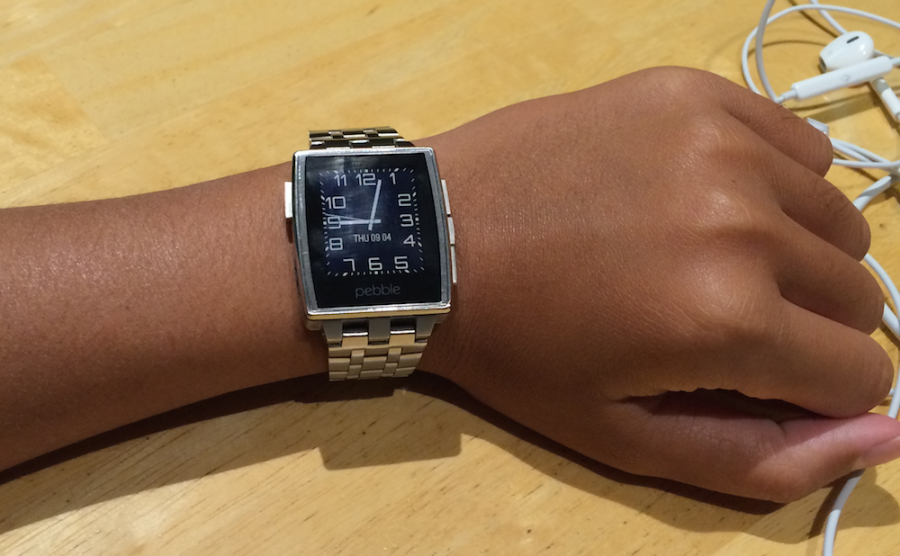Samsung announces new SIMBAND
Courtesy of Jonathan Trinh
Jonathan Trinh (11) uses his Pebble smartwatch to check his notifications and alarms. Samsung joined the field by introducing a design for a wearable watch that focuses on health monitoring.
Joining the industry of health wearables, Samsung announced its new SIMBAND, a wristband device incorporating the functions of fitness trackers, in addition to the health-monitoring apps provided on its smartphones.
Including features such as tracking heart rate and detecting the skin’s electrical conductivity, this device will have sensors built into it in order to provide information and data for users.
The device will leverage Samsung Architecture Multimodal Interactions (S.A.M.I.), a new data storage component that allows the wearable technology to store all information on a secure cloud for other applications and products to use.
Upper School nurse Clare Elchert believes that there is a market for products like the SIMBAND and recognizes its convenience and use.
“I think that anything that helps someone to be aware of how the body is functioning […] is a good thing,” she said. “I mean I don’t think it can take the place of following up with your physician or we’d have to see how accurate these things really are.”
Since Math teacher Misael Fisico has a nephew working for a company that creates similar technologies, he constantly receives these and finds the SIMBAND as something he would buy.
“I agree that it does help our community, our civilization, because in this century we have so much diseases coming out of nowhere,” he said. “We must in turn find solutions to help save the community health wise.”
On the other end of the spectrum, some people don’t trust these new types of technologies. As for Dipam Acharyya (12) specifically, he “doesn’t believe in Samsung.”
“I’m scared of wearable tech because I feel like they will follow you around and climb in bed with you,” Dipam said. “It’s kind of creepy.”
Samsung is not the only player in the wearable market. There are a wide range of devices that are designed to perform various functions. For example, Google Glass and Nod’s ring are two accessories designed to help users access information without using their smartphones. Those in the health industry, such as Jawbone and Fitbit, are looking to help users monitor their health and exercise patterns.
Recent speculations about Apple propose that the tech giant will also be joining the field of wearable devices with an iWatch, and greater integration with health services in iOS8.
According to Samsung’s website, the SIMBAND is not a commercial product but rather a “concept of what a smart health device should be.” Samsung hopes that the SIMBAND will help start a new generation of fitness devices.

Shannon Su is the Managing Editor and Executive News Director of Harker Aquila. She joined the program as a reporter her freshman year and has held many...


















![“[Building nerf blasters] became this outlet of creativity for me that hasn't been matched by anything else. The process [of] making a build complete to your desire is such a painstakingly difficult process, but I've had to learn from [the skills needed from] soldering to proper painting. There's so many different options for everything, if you think about it, it exists. The best part is [that] if it doesn't exist, you can build it yourself," Ishaan Parate said.](https://harkeraquila.com/wp-content/uploads/2022/08/DSC_8149-900x604.jpg)




![“When I came into high school, I was ready to be a follower. But DECA was a game changer for me. It helped me overcome my fear of public speaking, and it's played such a major role in who I've become today. To be able to successfully lead a chapter of 150 students, an officer team and be one of the upperclassmen I once really admired is something I'm [really] proud of,” Anvitha Tummala ('21) said.](https://harkeraquila.com/wp-content/uploads/2021/07/Screen-Shot-2021-07-25-at-9.50.05-AM-900x594.png)







![“I think getting up in the morning and having a sense of purpose [is exciting]. I think without a certain amount of drive, life is kind of obsolete and mundane, and I think having that every single day is what makes each day unique and kind of makes life exciting,” Neymika Jain (12) said.](https://harkeraquila.com/wp-content/uploads/2017/06/Screen-Shot-2017-06-03-at-4.54.16-PM.png)








![“My slogan is ‘slow feet, don’t eat, and I’m hungry.’ You need to run fast to get where you are–you aren't going to get those championships if you aren't fast,” Angel Cervantes (12) said. “I want to do well in school on my tests and in track and win championships for my team. I live by that, [and] I can do that anywhere: in the classroom or on the field.”](https://harkeraquila.com/wp-content/uploads/2018/06/DSC5146-900x601.jpg)
![“[Volleyball has] taught me how to fall correctly, and another thing it taught is that you don’t have to be the best at something to be good at it. If you just hit the ball in a smart way, then it still scores points and you’re good at it. You could be a background player and still make a much bigger impact on the team than you would think,” Anya Gert (’20) said.](https://harkeraquila.com/wp-content/uploads/2020/06/AnnaGert_JinTuan_HoHPhotoEdited-600x900.jpeg)

![“I'm not nearly there yet, but [my confidence has] definitely been getting better since I was pretty shy and timid coming into Harker my freshman year. I know that there's a lot of people that are really confident in what they do, and I really admire them. Everyone's so driven and that has really pushed me to kind of try to find my own place in high school and be more confident,” Alyssa Huang (’20) said.](https://harkeraquila.com/wp-content/uploads/2020/06/AlyssaHuang_EmilyChen_HoHPhoto-900x749.jpeg)



